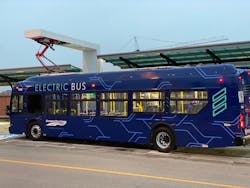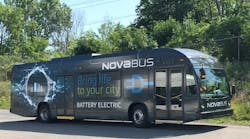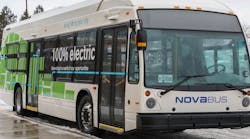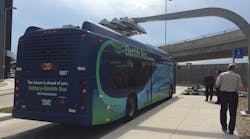Brampton launching eight zero-emission buses into service
Eight battery-electric buses will begin service in Brampton, Ontario, on May 4 as part of the first multi-city deployment of interoperable buses and charging equipment.
Brampton is part of the Pan-Canadian Battery Electric Bus Demonstration and Integration Trial, which aims to demonstrate interoperable charging and operation of battery-electric buses. The demonstration and integration trial is led by the Canadian Urban Transit Research and Innovation Consortium (CUTRIC) and includes Brampton, TransLink in Vancouver, B.C., and the Region of York.
The city explains its deployment of electric buses differs in that its buses are not tied to designated charging depots and its depot and on-road charging options allow for an increase in daily travel ranges on the electric buses.
Brampton was able to procure, install and will operate and maintain the eight electric buses and four overhead bus-charging stations through funding commitments by the government of Canada. The C$16-million program (US$13-million) received C$11.2 million (US$9.2 million) from Natural Resources Canada’s Electric Vehicle Infrastructure Demonstration (EVID) Program, which contributed $3.49 million (US$2.87 million), and Energy Innovation Program (EIP), which contributed C$7.67 million (US$6.31 million)..
“Brampton is a Green City and this is a significant milestone in sustainability for our community,” said Brampton Mayor Patrick Brown. “We are proud to collaborate with CUTRIC, our project partners and leaders in innovation for the Pan-Canadian Battery Electric Bus Demonstration and Integration Trial in Brampton. This project is a global first and will further enhance our transit network, which is one of the fastest growing in Canada.”
Two of Brampton Transit’s new buses have been supplied from Nova Bus and six are from New Flyer, while the four overhead pantograph on-route charging stations have been supplied by Siemens Canada (one) and ABB Inc. (three). Brampton explains each bus can charge completely in less than 10 minutes. Nova Bus says its 40-foot LFSe models can charge in less than six minutes.
Nova Bus Vice-President Legal, Regulatory and Public Affairs Emmanuelle Toussaint said the company was “honored and thrilled” to be part of Brampton’s electric fleet transition.
“As a key member of CUTRIC and part of the Pan-Canadian Battery Electric Bus Demonstration and Integration Trial, we are fully committed to the concerted efforts in the electrification of transportation. Clean and sustainable technologies are part of Nova Bus’s core,” said Toussaint.
During a virtual announcement, Canada’s Minister of Infrastructure and Communities Catherine McKenna recognized the country’s efforts to emerge from the COVID-19 pandemic, but noted that climate change is another crisis that requires attention.
“Helping residents of Brampton get around in faster, cleaner and more affordable ways is the goal of our investment in zero-emission buses. Today’s launch is an important milestone towards Brampton’s ambitious goal of reducing emissions by 80 percent by 2050 and toward our government’s commitment to add 5,000 zero emission buses over five years. It will support Canadian jobs, tackle climate change and build cleaner, more inclusive communities,” said Minister McKenna.
Brampton Transit has a fleet of 450 buses, including 133 diesel-electric hybrid buses. Each battery electric bus is expected to produce a savings of 235 metric tons of CO2 per year and achieve near zero emission in the vehicle’s lifecycle.
----------------------
Article was updated 5/7/2021 at 6:30 pm to correct the government of Canada's funding contribution amount and funding sources.

Mischa Wanek-Libman | Group Editorial Director
Mischa Wanek-Libman is director of communications with Transdev North America. She has more than 20 years of experience working in the transportation industry covering construction projects, engineering challenges, transit and rail operations and best practices.
Wanek-Libman has held top editorial positions at freight rail and public transportation business-to-business publications including as editor-in-chief and editorial director of Mass Transit from 2018-2024. She has been recognized for editorial excellence through her individual work, as well as for collaborative content.
She is an active member of the American Public Transportation Association's Marketing and Communications Committee and served 14 years as a Board Observer on the National Railroad Construction and Maintenance Association (NRC) Board of Directors.
She is a graduate of Drake University in Des Moines, Iowa, where she earned a Bachelor of Arts degree in Journalism and Mass Communication.







